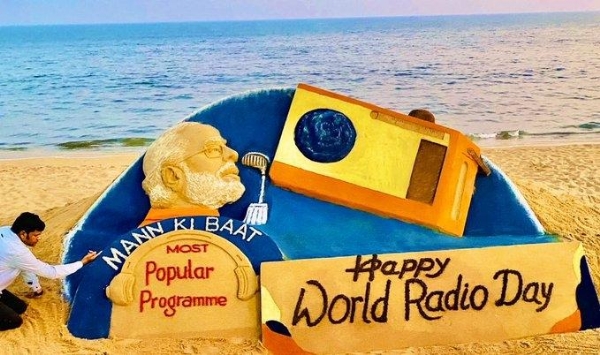'Mann ki Baat' & PM Modi's Radio Revolution
In India, The World Radio day takes on an unique flavor with Mann Ki Baat which revives this legacy, using radio to directly connect with citizens
Total Views |
Every February 13th, World Radio Day celebrates the enduring magic of Radio. This year's theme, "Radio: A Century of Information, Entertainment and Education," reflects the medium's resilience.

In India, radio's impact goes beyond facts and figures. Radio played a crucial role in India's fight for independence, serving as a tool for information and unity. In India, however, the day takes on an unique flavor with Mann Ki Baat which revives this legacy, using radio to directly connect with citizens, bypassing traditional media filters. This directness fosters intimacy and immediacy, allowing the Prime Minister to engage listeners on a personal level, potentially resonating more than formal televised addresses.
Beyond TV and Tweets: Why Radio?
Prime Minister Modi had diverse communication options – television offered wider reach, social media promised quicker interaction. Yet, he chose radio. Why?• Unlike TV or internet-dependent options, radio penetrates even remote areas, ensuring inclusivity even for marginalized communities. This echoes radio's historical role in India's freedom struggle, reaching across geographical and socioeconomic divides.
• The live format fosters a sense of immediacy and personal connection, potentially resonating more deeply than a pre-recorded, polished address. In an age of curated online personas, radio offers a refreshing touch of human connection.
• Radios are often more affordable and require less electricity than other options, making them accessible to a wider demographic. This aligns with the Prime Minister's message of inclusivity and reaching every citizen.
Elevating Radio in the Digital Age:
Mann Ki Baat isn't just a political address; it's a proof to radio's staying power:
• Content Versatility: The program delves beyond policy pronouncements, incorporating social issues, personal anecdotes, and even poetry. This showcases radio's ability to cater to diverse audiences and spark conversations on various topics, not just politics.
• Renewed Interest: Mann Ki Baat attracts younger demographics who might not otherwise tune in, ensuring the medium's relevance in the evolving media landscape. It's a reminder that radio isn't just for grandparents anymore.
Despite these complexities, the Mann Ki Baat and World Radio Day connection underscores radio's enduring power. In a world dominated by digital screens, radio offers a unique blend of reach, intimacy, and accessibility. As we celebrate World Radio Day, let's remember the voice carried through the airwaves, reminding us of the power of connection and the unexpected ways it can find its audience.


